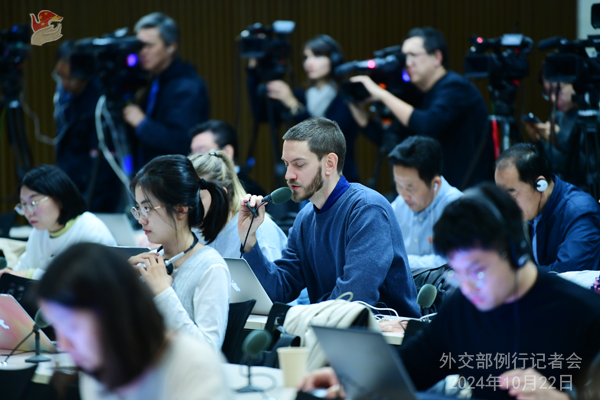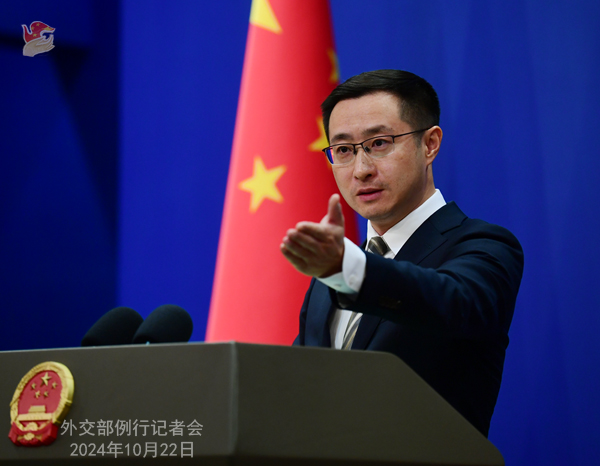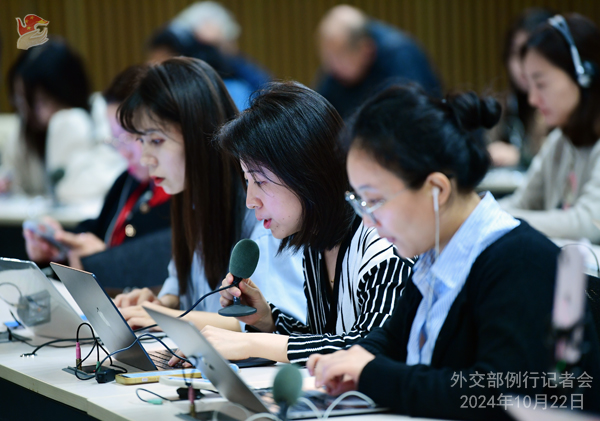
CCTV: On October 21, Luong Cuong, permanent secretary of the Secretariat of the Central Committee of the Communist Party of Viet Nam, was elected President of Viet Nam at the eighth session of the 15th National Assembly. What’s China’s comment? What are your expectations for China-Viet Nam relations?
Lin Jian: China congratulates Comrade Luong Cuong on his election as President of Viet Nam. We believe that under the leadership of the Central Committee of the Communist Party of Viet Nam, the Vietnamese people will make new and greater achievements in the cause of socialist modernization.
China and Viet Nam form a community with a shared future with strategic significance. Next year will be the 75th anniversary of the diplomatic ties between China and Viet Nam and the “China-Viet Nam People-to-People Exchange Year,” which brings new historic opportunities for the growth of bilateral relations. China is ready to join hands with Viet Nam to implement the important common understandings reached by the leaders of the two parties and two countries, carry forward our traditional friendship, deepen mutually beneficial cooperation, promote more solid progress in building the China-Viet Nam community with a shared future and deliver more benefits to the two peoples.
Reuters: The Indian Foreign Minister said yesterday that India and China have reached a deal on patrolling along the disputed border in the Himalayas. He said it can lead to disengagement and resolution of a conflict that began in 2020. Could we confirm with the Ministry that such an agreement was achieved? And are there other details? My second question related to this is, does the agreement open the path to a bilateral meeting between President Xi Jinping and Prime Minister Narendra Modi at the BRICS Summit happening now?
Lin Jian: Over a recent period of time, China and India have reached resolutions on issues concerning the border area following close communication through diplomatic and military channels. China commends the progress made and will continue working with India for the sound implementation of these resolutions.
On the bilateral meeting you mentioned, I answered the question yesterday. China will release timely information if anything comes up.
PTI: Now that you have confirmed the Indian Foreign Secretary’s announcement yesterday about the agreement reached to end the standoff there. And you also said China speaks highly about this particular agreement. Can you please provide some details? How the two countries came to reach an agreement? Has that agreement been completed? Is it ready to put it into implementation?
Lin Jian: As I just said, China and India have reached resolutions on issues concerning the border area following close communication through diplomatic and military channels. China will continue working with India for the sound implementation of these resolutions.

TASS: President Xi Jinping has traveled to Kazan by special plane to attend the 16th BRICS Summit. Yesterday, Aide to the Russian President Ushakov Yury said that President Vladimir Putin will meet with President Xi Jinping on the sidelines of the BRICS Summit on the 22nd. What are China’s expectations for this meeting?
Lin Jian: At the invitation of President of the Russian Federation Vladimir Putin, from October 22 to 24, President Xi Jinping traveled to Kazan, Russia to attend the 16th BRICS Summit. The two presidents will have an opportunity to meet and have an in-depth exchange of views on bilateral relations and international and regional issues.
Beijing Youth Daily: Recently Euronews in France, Travel And Tour World in the US, Lianhe Zaobao in Singapore and other media commented that in recent years, China’s visa-free policies, e-payment services, facilities with better bilingual services and convenient transport system have made foreigners’ travel in China much easier and brought in a good number of foreign travelers. Could I have your comment on that?
Lin Jian: Glad to see the growing popularity of “China Travel.” The latest statistics from competent authorities show that in the third quarter of this year, China received 8.186 million foreign travelers, up by 48.8 percent year-on-year. Among them, 4.885 million entered China visa-free, up by 78.6 percent year-on-year. Foreign media found that the number of travel bookings made by European tourists to China has already been higher than that in 2019.
The enthusiasm to visit China and better immersive experience of foreign travelers would not have been possible without the facilitating measures China rolled out, such as including more countries in its visa waiver program. Now waiting time for entry inspection and security check is further cut short, and foreign travelers can simply swipe their foreign bank card to take the subway. Their traveling, living and working in China have been much more convenient.
The days are getting colder in northern China, but our welcome remains warm. We will further improve visa-free policies and other measures, and make travel and stay in China more foreigner-friendly. China’s door to the world is always open. Welcome to unlock your experience here.
Bloomberg: I’m just to clarify your comments on the agreement with India. You said that China and India have reached a resolution on relevant matters. Can you specify what the relevant matters are? Is this about the border and the Line of Actual Control?
Lin Jian: I’ve answered that question and have nothing more to add.

The Paper: A few days ago, the World Congress of International Association for the Protection of Intellectual Property (AIPPI) opened in Hangzhou. About 2,300 participants from 92 countries and regions gathered to discuss hot topics in the field. This is the first time that the Congress was held in China since AIPPI’s establishment 127 years ago. What is your comment?
Lin Jian: This Congress is jointly hosted by the China Council for the Promotion of International Trade and the International Association for the Protection of Intellectual Property. It’s the first time that the Congress was held in China, which shows the international community’s full recognition of intellectual property protection in China. President Xi Jinping sent a congratulatory letter to the Congress, which reflects the importance China attaches to intellectual property protection.
China has been working to build a strong nation on intellectual property and engaged deeply in global intellectual property governance. It was decided at the third Plenary Session of the 20th Central Committee of the CPC that China is to establish an efficient system for the comprehensive management of intellectual property rights. China is the first country in the world that owns over 4 million domestic valid invention patents, and the number of international patent applications under the Patent Cooperation Treaty (PCT) has ranked first in the world for five consecutive years. China has also established stable cooperation relations with more than 80 countries and regions, and has more than 200 intellectual property cooperation agreements in effect.
Intellectual property protection contributes to China’s high-quality development, turns “Made in China” to “Innovated in China” faster, and facilitates China’s high-standard opening up as it generates a law-based, pro-innovation and business-friendly environment. We protect the intellectual property rights of domestic and foreign enterprises equally. The numbers of applications, authorizations and holdings of intellectual patents of foreign companies in China have increased rapidly year by year. By June this year, the numbers of foreign valid invention patents and valid registered trademarks in China had reached 919,000 and 2.135 million respectively. This speaks to foreign investors’ full confidence in China’s intellectual property protection.
China is ready to work with all countries to strengthen practical and mutually beneficial dialogue and cooperation, and join hands to build a global governance system on intellectual property featuring extensive consultation, joint contribution and shared benefits, so that foreign enterprises can better share in the dividends of China’s development and that the international community can better benefit from intellectual innovation.
Bloomberg: Prime Minister Modi is going to the BRICS forum as well as President Xi. Is it the hope of the Chinese government that the two men will be able to meet at the forum?
Lin Jian: I just answered the question. China will release timely information if anything comes up.
China Daily: As far as we know, China has decided to renew the provisional agreement on the appointment of bishops with the Vatican. Can you confirm that? What’s your comment?
Lin Jian: Since it was signed in 2018, the provisional agreement regarding the appointment of bishops between China and the Vatican has been extended in 2020 and 2022 respectively. The achievements in the implementation of this agreement have been commended by both sides. The two sides, through friendly consultation, have agreed to extend the agreement for another four years. The two sides will maintain contact and talks in a constructive spirit and continue to advance the improvement of China-Vatican relations.
